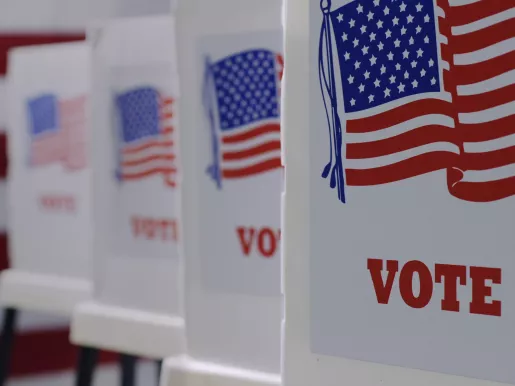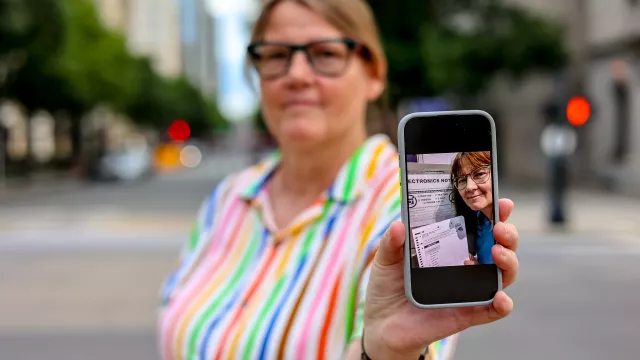Table of Contents
First Amendment rights at the polls FAQ

Last updated Oct. 16, 2024.
Free speech and fair elections are the foundation of any healthy democracy.
When voters know their rights, they are better prepared to evaluate political candidates, engage in debates, and advocate for their beliefs.
That’s why FIRE is here to explain your First Amendment rights at the polls and how you can — and sometimes can’t — express yourself when it comes time to hit the ballot box.
Can I bring notes, campaign literature, or other materials into the voting booth to help me decide how to vote?
The First Amendment likely protects voters’ right to bring personal notes into the voting booth to help inform their decisions. Although no court appears to have addressed this precise issue, courts have said polling place rules must be reasonable and viewpoint neutral.
A ban on voters bringing private materials to help them decide how to vote would likely be unreasonable — and therefore unconstitutional — for an area set up for voters to make decisions. However, because the purpose of the voting booth is for voters to make decisions themselves, states can restrict campaign literature that is not for personal use. For instance, states can prohibit you from handing out campaign flyers to voters inside or directly outside the polling place.
Can I solicit votes or pass out or display campaign materials in or outside a polling place?
As explained above, although you can bring campaign literature to the polls for personal use, it is important to keep such material private. Most states have strict laws that prohibit electioneering in or around polling places.
These laws include bans on displaying such material or openly advocating for a candidate or ballot measure. Some states ban loitering. The bans are usually effective within 100 feet of a polling place, but there is a lot of state variation. Louisiana’s zone is the largest at 600 feet. The National Conference of State Legislatures maintains a list of electioneering prohibitions.
What can I wear to the polls? Are any types of clothes prohibited?
Voters have a right to wear most types of clothing, with only relatively narrow possible exceptions.
As mentioned above, regulations at a polling place must be reasonable and viewpoint neutral. The Supreme Court held in Minnesota Voters Alliance v. Mansky (2018) that a blanket ban on “political” apparel was unconstitutional. The Court noted that such a broad ban seemingly encompassed a wide range of messages. (Taken literally, the ban would even have prohibited a button simply saying, “Vote!”).
So restrictions on clothing advocating for (or against) ideologies or causes are generally going to be unconstitutional.
However, the First Amendment right to wear political apparel isn’t boundless. The Court implied in Mansky (but did not explicitly hold) that restrictions on apparel with explicit references to candidates are constitutionally permissible.
As noted above, most states have strict laws prohibiting electioneering, and this often applies to clothing as well, including shirts, hats, and buttons. These restrictions are generally only for apparel referencing a candidate or ballot measure. There are currently 21 states that have statutes banning electioneering clothing, per the NCSL.
Can I take a ballot selfie at the polls?
The Constitution protects your right to vote and show others how you voted. And in many states, such as California, Virginia, and Washington, that constitutional right is upheld by local law. But some states have banned the practice or have unclear rules surrounding it.

LAWSUIT: North Carolina woman challenges state’s unconstitutional ‘ballot selfie’ ban
FIRE is suing members of the North Carolina State Board of Elections to overturn multiple unconstitutional laws banning ballot selfies.
Laws banning ballot selfies sit on shaky constitutional ground. FIRE is currently challenging a North Carolina law that bans ballot selfies after the state sent a threatening letter to a political activist who shared a photo of her ballot on social media. And other courts, including the U.S. Court of Appeals for the First Circuit, have held ballot selfie bans violate the First Amendment by imposing “broad restriction[s]” on speech in order “to combat an unsubstantiated and hypothetical danger.”
In states including (but not limited to) Florida, Massachusetts, Mississippi, Missouri, Montana, Nevada, and New York, you could get in trouble for taking a picture of your ballot and posting it on social media. Even when something is a constitutional right, vindicating that right can take time, so it’s a good idea to know for sure what your state’s rules are.
To see which states allow ballot selfies, as well as where the practice is illegal, check out this map of ballot selfie laws across the United States.

